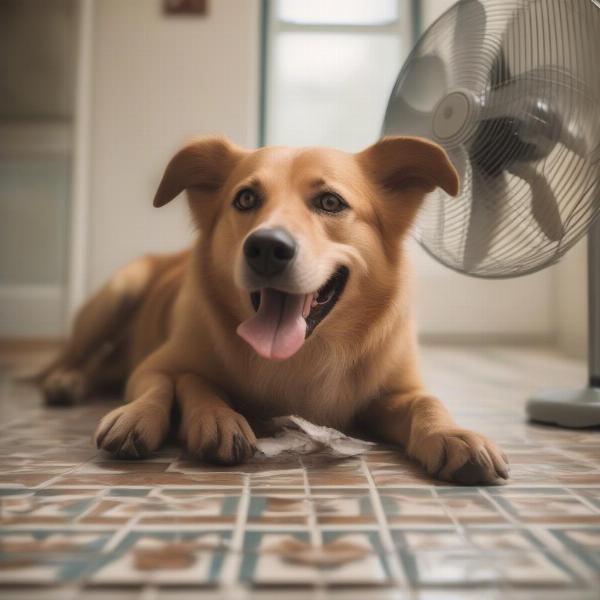If you’ve noticed your dog panting heavily at night, you’re likely concerned. While some panting is normal, excessive panting, especially at night, can be a sign of an underlying issue. This article will explore the various reasons why your dog might be panting so much at night and what you can do about it.
Common Causes of Nighttime Panting in Dogs
Several factors can contribute to a dog panting excessively at night. Let’s delve into some of the most common reasons:
Heat and Temperature
One of the most obvious reasons for panting is overheating. Dogs don’t sweat like humans; they regulate their body temperature through panting. If your home is too warm at night, or your dog is sleeping under heavy blankets, they may pant to cool down. Ensure your dog has access to a cool, well-ventilated area and avoid overdressing them in pajamas or blankets.
 Dog panting on a hot night
Dog panting on a hot night
Anxiety and Stress
Just like humans, dogs can experience anxiety and stress. This can manifest as excessive panting, pacing, whining, and restlessness, especially at night when things are quiet and anxieties can surface. If your dog is prone to anxiety, consider creating a calming bedtime routine, using a pheromone diffuser, or providing them with a comfortable, secure sleeping space.
Pain and Discomfort
Panting can also be a sign of pain or discomfort. If your dog is experiencing pain from an injury, illness, or arthritis, they may pant more at night when they are resting and the pain becomes more noticeable. If you suspect your dog is in pain, consult your veterinarian immediately for a proper diagnosis and treatment plan.
Medications
Certain medications, such as steroids and pain relievers, can have panting as a side effect. If your dog recently started a new medication and you notice increased panting, contact your veterinarian to discuss possible adjustments or alternatives.
Underlying Medical Conditions
Several medical conditions can cause increased panting, including heart problems, respiratory issues, Cushing’s disease, and anemia. If your dog’s panting is persistent, accompanied by other symptoms like coughing, lethargy, or changes in appetite, it’s crucial to seek veterinary attention.
Is Your Dog’s Panting Normal?
Determining whether your dog’s panting is normal or a cause for concern requires careful observation. Occasional panting after exercise or on a hot day is typical. However, persistent, heavy panting, especially when the dog is at rest, warrants a visit to the veterinarian.
When to See a Vet
If your dog’s nighttime panting is accompanied by any of the following signs, seek immediate veterinary care:
- Pale gums
- Weakness or collapse
- Difficulty breathing
- Coughing or gagging
- Changes in appetite or drinking habits
What Can You Do to Help Your Dog?
While it’s essential to consult a vet for diagnosis and treatment, there are a few things you can do to make your dog more comfortable:
- Ensure a cool and comfortable sleeping environment.
- Provide fresh water at all times.
- Create a calming bedtime routine.
- Offer a safe and secure sleeping space.
Conclusion
Excessive panting at night in dogs can indicate various issues, from simple overheating to serious medical conditions. By carefully observing your dog and seeking professional veterinary advice when necessary, you can ensure your furry friend’s health and well-being. If your dog is panting excessively at night, don’t ignore it. Addressing the underlying cause can significantly improve your dog’s quality of life.
FAQ
- Is it normal for dogs to pant at all? Yes, some panting is normal, especially after exercise or in warm weather.
- When should I be worried about my dog’s panting? If the panting is excessive, persistent, or accompanied by other symptoms, consult a vet.
- Can anxiety cause panting in dogs? Yes, anxiety and stress can lead to increased panting.
- What should I do if my dog is panting heavily at night? Ensure they are cool and comfortable, have access to water, and consult a vet if the panting persists.
- What medical conditions can cause panting in dogs? Heart problems, respiratory issues, Cushing’s disease, and anemia are a few examples.
- How can I help my dog who is panting due to anxiety? Create a calming routine, use pheromone diffusers, and provide a safe space.
- What are the signs that my dog’s panting is an emergency? Pale gums, weakness, collapse, difficulty breathing, and changes in eating or drinking habits.
For further reading on dog health and nutrition:
About ILM Dog
ILM Dog is your trusted resource for expert advice on dog breeds, health, training, nutrition, grooming, and more. We provide practical tips and insights for dog owners of all levels, from seasoned professionals to first-time puppy parents. We cover various topics, including breed selection, health and medical care, training and behavior, nutrition and feeding, grooming and hygiene, exercise and activities, puppy care, senior dog care, traveling with your dog, and product reviews. For all your dog-related questions and concerns, contact us at [email protected] or call us at +44 20-3965-8624. Visit ILM Dog today!